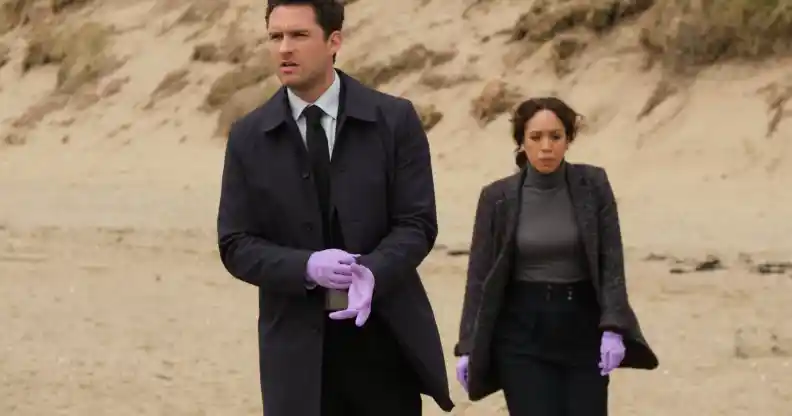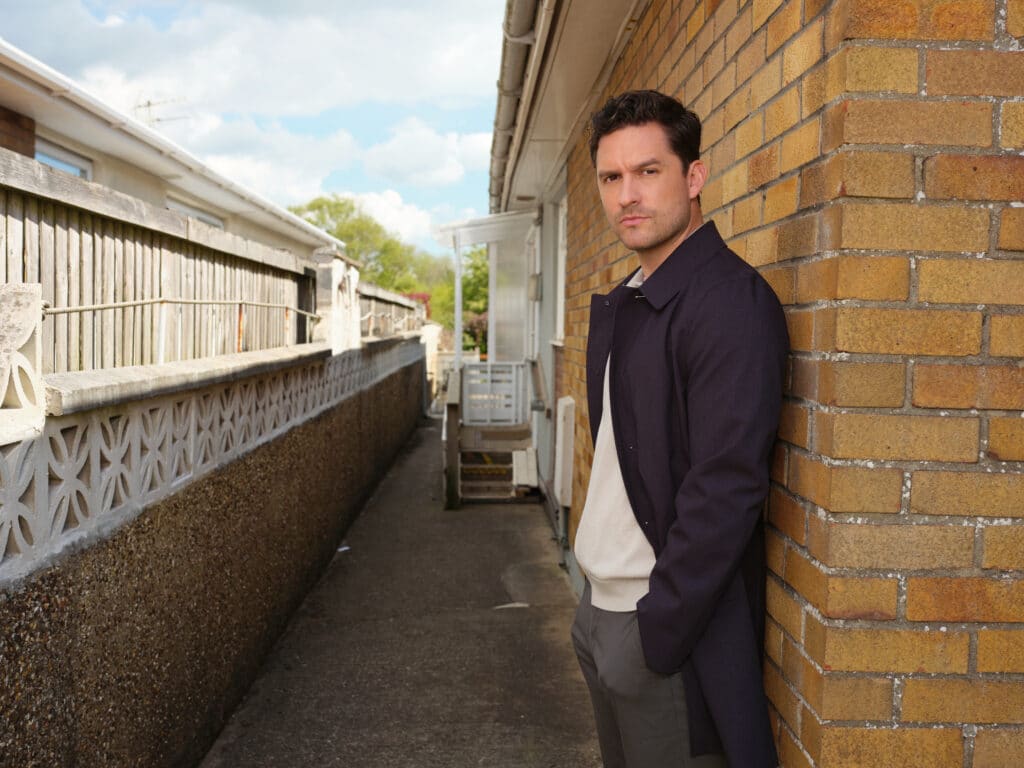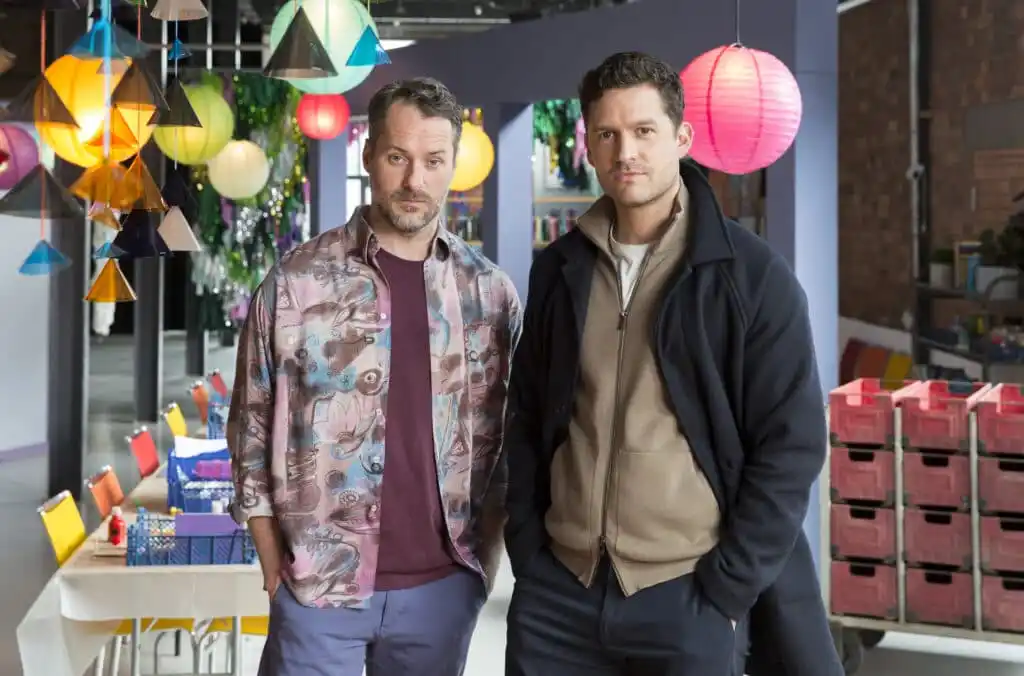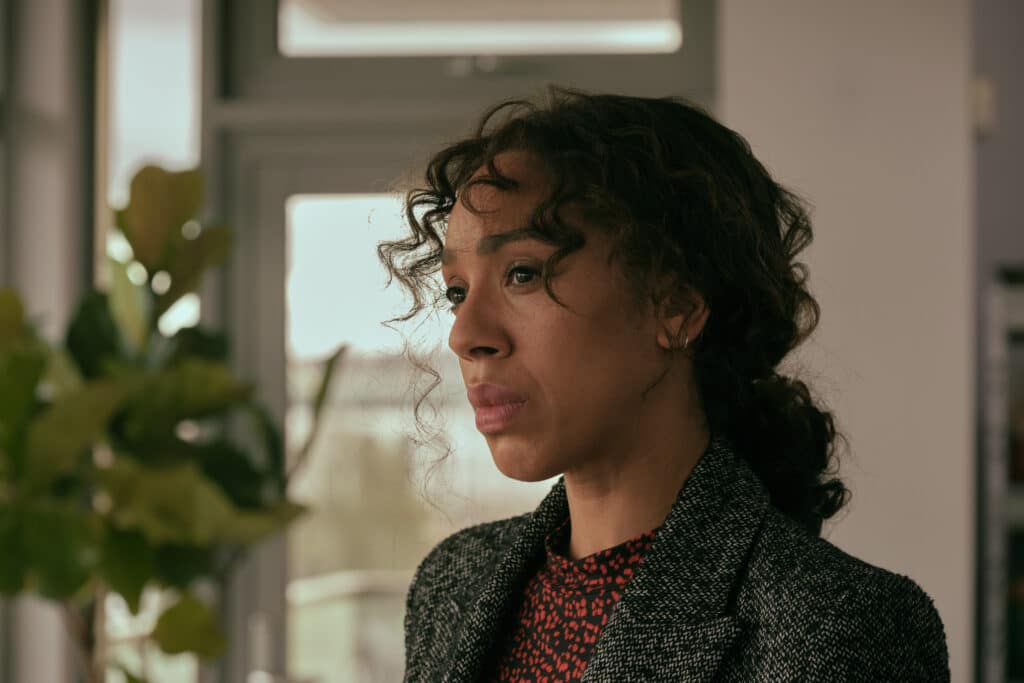Ben Aldridge and Pearl Mackie on the subtle way their gay crime drama is helping queer kids belong

Ben Aldridge as DI Matthew Venn and Pearl Mackie as DS Jen Rafferty in ITV’s The Long Call. (ITV)
British television has broken down so many barriers in LGBT+ representation over the years. From Michael Cashman’s famous gay kiss on EastEnders, to Brian Dowling’s Big Brother victory and iconic dramas like Sugar Rush and It’s a Sin.
Comedians like Sandi Toksvig and Graham Norton have shown the world that, yes, queer people can be hilarious too.
ITV crime drama The Long Call gives LGBT+ viewers another first. The atmospheric coastal whodunnit follows Matthew, a gay detective who has recently moved back to his hometown in Devon. While settling into a new home with his husband, Matthew is confronted with insecurities and triggers from his old-school Christian upbringing. As these tensions simmer, a man is found dead on the beach. Scratching beneath the surface of this tight-knit community, we discover that all is not what it seems.
Matthew is portrayed by actor Ben Aldridge, who came out publicly as gay last summer. Solving the case alongside him is Jen, a detective played by bisexual actor Pearl Mackie, who also finds her life at a crossroads. Incredibly, Aldridge and Mackie share something huge in common: not only did they both publicly come out as LGBT+ at the same time, but they both did so via social media on World Pride Day (June 27).
In recent years we’ve seen a variety of queer killers on our screens, from Don’t F**k with Cats to The Assassination of Gianni Versace and Killing Eve. But a crime drama starring a gay detective and two openly queer actors feels like new territory for British television in particular. PinkNews caught up with Ben and Pearl to discuss coming out, queer icons and the power of LGBT+ representation in television.
PinkNews: What drew both of you to The Long Call?
Ben: It was that Matthew’s queerness was central to his journey, and the journey of lots of other characters as well. Sometimes it feels like content producers are kind of ticking a box when it comes to representation. They’re making gay characters gay but they’re really not necessarily exploring how that affects their life or how that changes their life. So I was pleased to read that here it was really central to his journey and how to interact with the people around him. Matthew thinks he’s overcome and dealt with a lot of his past. But the story kind of takes him into all these trigger zones, where he has to confront and communicate with people that don’t accept him and judge him.
I didn’t know about about the part being the first ever male gay lead detective when I first read it. I think it’s a really nice factor and it’s significant, but it’s not necessarily what drew me in. It was more the character himself.
Pearl: Having a gay male detective, as the lead in a primetime ITV detective drama isn’t something that I’d ever seen before. So that was really exciting and as part of the LGBTQ+ community I was like, “This is great representation!” The show explores Matthew’s sexuality and how he was turned away from the community he grew up in because of his sexuality. We watch him revisit that and reopen some old wounds to get a sense of conclusion. I just felt like it was really relatable to many members of the queer community. I thought that it was just great to have that on primetime TV. And Jen isn’t your typical police officer either. She’s been through a horrendously abusive relationship with the father of her children. When we meet her, she’s only just escaped. I just found that really interesting.

Ben Aldridge as DI Matthew Venn in ITV’s The Long Call. (ITV)
Ben, you’ve spoken recently about your Christian upbringing. How did that factor into your preparation for the role?
B: I can really relate to that feeling of going home. I didn’t come out until I was 26, which for me seems quite late. Going home meant kind of neutralising back into a very “safe” presentation of myself. I’d been so used to hiding things and I was sometimes quite shut-off to my family. I think they stopped asking questions because I was such a closed book. I was very selective about what I let them know.
So I have to challenge myself now with adulthood to talk about my queerness and my gayness and make sure that it’s something that I can involve in a conversation, without worrying about having to “manage” the other person’s reaction in my family. It’s something I’m still working on. So I think with Matthew, he’s definitely navigating that in his everyday life. In terms of my preparation, there was just so much that I could relate to.
It seems like there’s a lot of iconic mystery stories set by the sea, like Big Little Lies and ITV’s The Bay. Why do you think that is?
B: The ocean is a very powerful force, isn’t it? It contains a lot of mystery and secrets bubbling beneath the surface. So really I suppose it’s an extended metaphor. Our director definitely makes good use of that.
P: I grew up in inner city London, so I haven’t had much experience of living in a kind of coastal location! But I imagine, especially the town that we explore in Devon, it’s quite small, so there’s so many different elements coexisting and crashing against each other. Rural communities can seem chilled-out, to someone like me who grew up in a big city, but beneath the facade there’s a lot of politics. So the ocean is a good backdrop for those sorts of clashes, with the waves crashing around. There’s something about it that can be so evocative.
There’s been so many iconic crime dramas lately. Did you watch any in preparation for the role? What are some of your faves?
P: I loved Mare of Easttown. Ben and I actually spent a lot of time watching it while we were filming and I eventually thought “I’m going to have to stop watching this now, because I’m just going to want to make my character exactly like her!” I love Unforgotten too, I binged a lot of that in lockdown.
Pearl, it seems like female leads in crime dramas are having such a moment right now?
P: Definitely. What I loved about both of those shows was that the female characters in particular weren’t perfect, they were flawed. That’s what we do as humans and that’s what makes any drama much more compelling.
We’ve seen lots of gay killers on TV lately, from The Assassination of Gianni Versace to Don’t F**k with Cats and Killing Eve. What was it like turning that entirely on its head by playing a detective?
B: In The Long Call we’re definitely seeing a gay man existing in a different space than we have before. His relationship is really stable and strong. It’s probably the most stable element of the entire show, in fact. It’s also the only place that he’s really able to be himself and let go. I’ve not done many queer projects, and I suppose my heart might been led to something that was celebratory and joyous, but there are also parts of the community where it’s people existing very “normal” situations, which we don’t often see on TV. So it was interesting to portray that everyday experience.

Ben Aldridge as DI Matthew Venn and Declan Bennett as Jonathan Roberts. (ITV)
Both of you are LGBT+. Did that create a closeness between you on set?
B: I can’t tell you what a relief it was, actually. Pearl and I had both come out publicly on World Pride Day in June, so we’re both on this “baby queer” journey into our industry together. There were lots of other queer people on set too, from the director to the actor who played my husband and even runners and other members of the crew. It just felt great and one of my favourite parts of the job.
P: It was always part of the conversation and it was just really lovely to be on the set and to share experiences that we’ve as queer people. The joy of being able to talk about that confidently on set really brought us close together. I felt really seen, respected and understood. Ben asked me very kindly to present him with an Attitude Award recently, which was really lovely!
Pearl, you went to university and drama school in Bristol. What was it like returning to film parts of this show?
P: I was there for five years, from when I was 18 to 23, so it’s a time that I had a lot of experiences and a lot of big dreams. It was quite overwhelming being back. Drama school was great and I had a wonderful time, but it was really hard as well. It was really nice to go back at a time in my life where I feel really happy with myself and who I am, and also really happy with my career and where it’s going. So, yeah, it did feel kind of full circle!
You mention that both of you came out publicly in 2020. What was it about that time which prompted you to do that?
B: I started therapy over Zoom as lockdown started and I suppose I was doing a lot of work on myself. Also, after the murder of George Floyd and other things going on around the world, I think people were really taking a stand for who they were. So it just felt like an essential step to make myself visible in that way.
P: It wasn’t a coincidence, I don’t think! It was obviously a mad time for everyone. There was a lot of time for reflection – potentially too much time for reflection, actually. Then the murder of George Floyd happened and Black Lives Matter became a global movement. Everything in the news made me look at my life and experiences. A lot of Black people started thinking about our lives and sharing a lot. And I just felt like, “Well, there’s this huge other part of me I’m not sharing.” I couldn’t understand why I wasn’t being open about my sexuality, because it’s a huge part of who I am! I didn’t think it would be a big deal, but when I did it, I felt like a weight had been lifted. I feel instantly more comfortable now because I feel like I’m being fully open about how I am.

Pearl Mackie as DS Jen Rafferty in ITV’s The Long Call. (ITV)
Do you think coming out has improved your work? Or your relationship to it?
B: If you’re being an authentic version of yourself in the world, the world’s going to react to you differently, I think. I do think it’s affected my work. I feel like I have more emotional depth than I did before and I feel like I feel like my skin’s a little bit thinner. It’s almost like I was potentially a bit blocked before? My life has improved in ways that I can articulate and in ways that I can’t quite put words to yet.
P: It’s interesting, because I definitely used to think that, to be a great actor, you had to hold onto trauma and bad things that have happened to you, to then use them in your work. But I actually disagree with that now. I think you can definitely be in a happy and content place within yourself and still explore the darker spaces that you need to access to play a role. I’m not sure whether coming out has made me a better actor – you’ll have to watch the stuff I’ve done since I came out and be the judge!
Who is your queer icon and why?
B: It’s probably very obvious but I’d say RuPaul. Drag Race has really provided a central place for our community to learn about itself and to celebrate itself. Also my friend Tom Allen, the TV presenter, wrote a book last year called No Shame. I went to the National Youth Theatre with him when I was young, so to watch what he’s become and the way he navigates the world makes him a personal icon of mine.
P: I love Billy Porter. I think he is just amazing. His honesty and openness and talent. He’s worked so hard to get to where he is and it just fills me with joy and hope that there is space for queer black people in the world. He just makes me feel so hopeful.
And do you have a favourite queer space?
B: I love Freedom in Soho and also The Glory in East London. My boyfriend is American so we love going to drag bars in LA and New York too!
Why is TV such a powerful way of educating people about LGBT+ lives?
B: The power representation is undeniable. We seem to be in the golden age of TV and I really think it changes things! I was starved for any LGBT+ representation when I was younger. Things have really changed now and our stories are brilliant stories, which deserve to be told. I really hope we can continue exploring the intersections and tell as many different stories as possible in different ways.
P: I think TV is so crucial, because it’s literally seeing yourself. For young people who haven’t come out yet, if you don’t see yourself reflected, then you don’t feel like you belong. It’s really important for us to show everyone that they belong and that there is space for them and that we see them. And even for people who aren’t queer themselves, it’s valuable to learn about other peoples experiences and TV let’s you do it from your living room while also being entertained.

